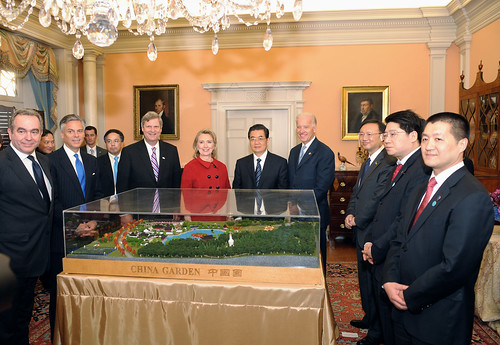
Today, I joined China’s Ambassador to the United States Zhang Yesui to sign a Memorandum of Understanding to construct a classical Chinese garden at the U.S. National Arboretum in Washington, D.C. This garden will illustrate the commitment our two countries have to horticulture, science and the arts and will serve as a testament to our countries’ celebrated cultural histories, delighting visitors for generations to come. I was pleased to join Ambassador Zhang and Madame Jiang Zehui to help turn this symbol of bilateral friendship into a reality. Madame Jiang Zehui is the executive director for the Chinese side for the China Garden.
Last week I had the opportunity to showcase a model of the garden to China’s President Hu during a luncheon with Vice President Biden and Secretary of State Clinton. The China Garden project has its roots in a 2004 gift from the Government of China and represents an opportunity to build a permanent tribute to U.S.-China relations in our nation’s capital.
China’s rich flora and long history of garden development has had a profound influence on horticulture and garden design throughout the world. Chinese classical gardens are designed to represent a harmonious blending of man and nature. The China Garden will complement the Asian collections including the National Bonsai and Penjing Museum already found at the National Arboretum.
The People’s Republic of China is to provide some 22 structures, classical Chinese art and furnishings, as well as the landscaping and rockeries for the garden. Once completed, the U.S. National Arboretum will own the China Garden. It is expected to become a focal point for cultural activities as well as a vibrant link between the United States and China. As a living classroom, it will provide a venue ready for the development of cultural and educational activities, and celebrations of major events like the Chinese New Year and full moon festivals.

